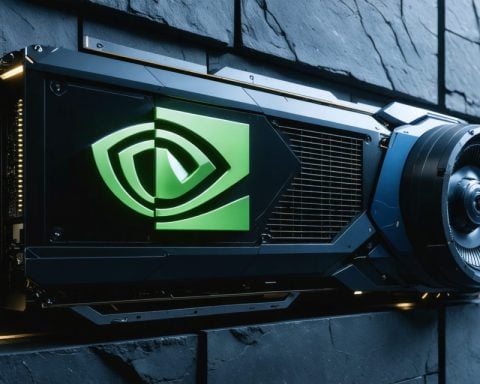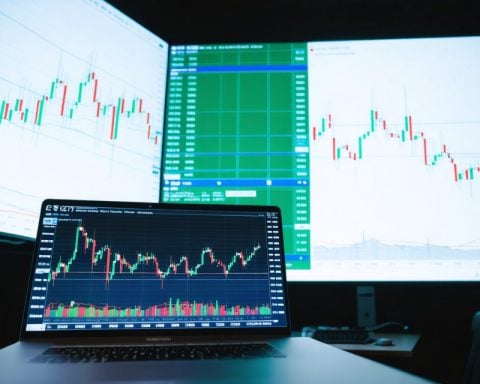- The New York Stock Exchange grapples with market volatility following a recent sell-off, especially affecting tech stocks.
- Key companies like Microsoft, Nvidia, and Palantir experience significant declines, shaking investor confidence in the tech sector.
- Concerns arise about a potential AI bubble as Palantir’s stock plummets, but some maintain optimism about AI’s future potential.
- Nvidia’s upcoming earnings report is highly anticipated, as it could indicate either a revival of fortunes or confirm fears of overvaluation.
- Home Depot’s financial insights are also awaited, with potential implications for consumer spending and market sentiment.
- The Conference Board’s consumer confidence data is expected to indicate economic trends and influence investor attitudes.
- Fluctuations in sectors like telehealth and steel capture attention, highlighting the need for resilience and strategic vision in navigating uncertainty.
Against the swirling electronic hum of the New York Stock Exchange floor, traders wrestle with the tech-driven tempest buffeting the markets. The aftermath of last week’s sell-off leaves the S&P 500 languishing, futures hesitantly probing the unsteady ground. As shadows lengthen, the once-sparkling promise of tech giants seems to flicker, casting doubt over the entire sector.
The sobering decline of heavyweights such as Microsoft, Nvidia, and Palantir reverberates, sowing uncertainty across portfolios. Palantir’s weighty dip underscores an erosion of faith within a market once buoyant with AI dreams, as investors grapple with the specter of an AI bubble. Yet amid the gloom, some still clutch to optimism, arguing that the AI narrative retains vitality, its crescendo yet to climax.
With Nvidia’s earnings looming on the horizon, the curiosity enlivens debate: Are fortunes revivable, or will results affirm suspicions of overreach? The financial stage readies itself for Home Depot’s insights as dawn breaks, promising further twists in this unfolding drama.
Meanwhile, the pulse of consumer confidence draws scrutiny, its rhythm a harbinger of economic disposition. Expected to wane, the Conference Board’s data may either fortify or further unsettle investors’ resolve, threading meaning through complex market machinations.
As the drama intensifies, unfolding in real-time with seismic moves after hours—the telehealth plunge and steel’s stumble—each tick echoes into the night. Amid this swirl of numbers and narratives, the challenge emerges clear: Navigating uncertainty demands not just resilience, but a vision tuned to the subtle signals steering commerce’s course. In this arena of flux, one question dominates: where next for Wall Street’s wandering minds?
Will the Tech Sector Reinvent Itself or Is the Bubble Set to Burst?
How-To Steps & Life Hacks for Navigating a Volatile Market
1. Diversify Your Portfolio: Balance risk by investing in various sectors. Don’t put all your eggs in the tech basket even though it might be tempting when it booms.
2. Stay Informed: Regularly read financial news from credible platforms like Yahoo Finance for real-time updates.
3. Assess Risk Tolerance: Understand your comfort with risk. If current market swings are too extreme, consider safer investment options.
4. Use Stop-Loss Orders: Protect your investments from dipping too low by setting limits on the price decline you’re willing to tolerate.
Real-World Use Cases in Investment Strategy
Investors are increasingly adopting AI-driven analytics to predict market trends. AI systems can analyze extensive datasets swiftly to identify trends and make data-driven predictions.
Market Forecasts & Industry Trends
According to a study by Fortune Business Insights, the AI market is projected to grow from $387 billion in 2022 to over $1,394 billion by 2029, reflecting a CAGR of 20.1%. This indicates a sustained belief in the tech sector’s potential, despite short-term volatility.
Reviews & Comparisons
When compared, tech giants like Nvidia and Microsoft maintain prominent positions due to their AI investments. Nvidia’s focus on GPUs for AI workloads gives it a robust competitive advantage.
Controversies & Limitations
While AI is positioned as a game-changer, ethical concerns persist. Issues around privacy, data security, and algorithmic bias create hesitations among investors, potentially stalling faster adoption.
Key Features, Specifications & Pricing
Upcoming earnings reports will provide detailed insights into corporate strategies. Nvidia’s cutting-edge GPUs and AI technologies remain a focal point for tech evolution, while Microsoft’s diversified product portfolio covers software to cloud-based solutions.
Security & Sustainability
Concerns about sustainability are rising. Tech companies are under pressure to reduce carbon footprints, with commitments to more sustainable operations gaining traction. Ensuring security in AI applications is also crucial, with an emphasis on safeguarding data.
Insights & Predictions
The tech sector will likely see further innovation spurred by AI, but the journey will entail overcoming privacy and ethical challenges. Investors might see increased volatility, suggesting that long-term perspectives could yield the best results.
Tutorials & Compatibility
For hands-on experience, investors can use platforms like E*TRADE or Robinhood to simulate investment strategies before committing real capital, thereby understanding compatibility and usability.
Pros & Cons Overview
Pros:
– Potential for high returns with AI and tech innovations.
– Increased efficiency and analytics.
Cons:
– High volatility and risk of substantial losses.
– Ethical and security concerns impacting investment sentiment.
Actionable Recommendations
– Stay Diversified: Ensure your portfolio covers more than just tech sectors.
– Monitor Earnings Reports: Pay attention to reports from key players like Nvidia for future directions.
– Leverage AI Tools: Use AI analytics to make informed investment decisions.
– Consider Sustainable Investments: Opt for companies committing to reducing their environmental impact.
By staying informed and agile, and adopting a diversified investment approach, you can navigate the tumultuous waves of the current market landscape with greater confidence and strategic insight.



















